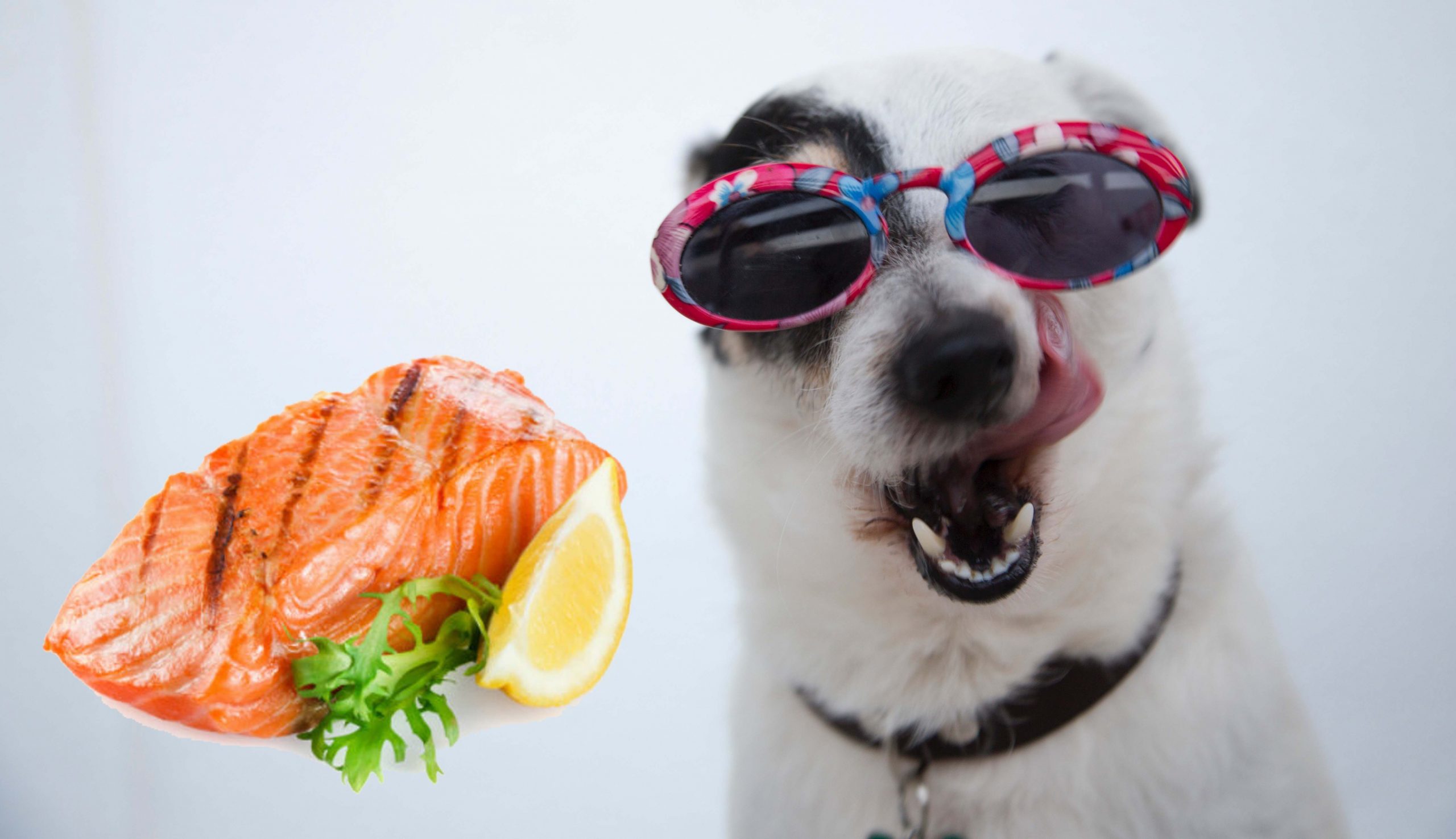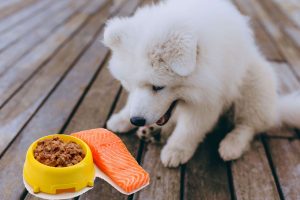Is salmon OK for dogs? Salmon is an excellent source of protein and healthy omega-3 fatty acids. It’s also easy to digest. So, what is the verdict? Generally speaking, it’s “yes.”
Proteins and fatty acids play an important role in a dog’s body. Proteins are the building blocks of the canine body and are essential for the growth, maintenance, and repair of tissues. Omega-3 fatty acids are a type of unsaturated fat necessary for the proper functioning of the immune system and for the health of the skin and coat, as well as to reduce inflammation throughout the body. Salmon also has anti-inflammatory effects, which may be beneficial to dogs that suffer from allergies or joint pain.
No doubt, salmon is a portion of healthy and nutritious food for dogs, but there are a few things to keep in mind, though.
First and foremost, whenever possible, wild-caught salmon should be used. While farmed salmon has fewer contaminants, it also has less nutrition.
Secondly, make sure to cook the salmon properly. Because raw salmon can contain hazardous bacteria, it’s crucial to boil it fully.
Finally, while your dog is eating salmon, keep an eye on it. Some dogs are allergic to fish, while others simply dislike its flavor. If you notice any adverse reactions, discontinue feeding salmon to your dog.
Overall, salmon is a nutritious and healthful diet for dogs.
Try to choose wild-caught Salmon and cook it thoroughly. And, as always, consult with your veterinarian if you have any questions or concerns about your dog’s diet.
Food Value Of Salmon
Salmon is a healthy dog food choice because it is high in protein and low in saturated fat. Maximum people know that salmon is an excellent source of protein and healthy omega-3 fatty acids, but it has some other food ingredients that make it a superfood and the best dog food. Cooked salmon has 17 grams of protein and 2.3 grams of omega-3 fatty acids in a 3-ounce meal. In addition to being a good source of nutrients, it is also relatively low in mercury and other toxins. As a result, it’s a good choice for people who are concerned about mercury and other toxins.
The nutritional value of salmon is highlighted below:
- high in protein and low in saturated fat
- full of omega-3 fatty acids
- enriched with vitamin D and calcium
- a good source of selenium
- a plentiful source of phosphorus
- a good quantity of magnesium
- enriched with iron
- enough portion of potassium
- a good source of zinc
- a good source of vitamin B12
The high protein and low saturated fat content make salmon a portion of ideal dog food, as it helps to maintain their muscle mass and keeps them lean. Dogs benefit from omega-3 fatty acids because they maintain their coats healthy and shiny. Vitamin D and calcium are also essential for dogs, as they help to keep their bones strong and healthy.
The selenium present in salmon is beneficial for dogs as it helps to protect their cells from damage. The phosphorus helps to keep their teeth and bones healthy. The magnesium helps to maintain their energy levels. The iron helps to transport oxygen around their body. The potassium helps to regulate their blood pressure. The zinc helps to boost their immune system. Vitamin B12 helps to keep their nervous system healthy.
After all, is salmon OK for dogs? The above benefits say “Yes.”
Is Salmon Good For Dogs Everyday
Salmon is a tasty and healthy fish with a variety of health benefits. However, there are a few disadvantages to eating salmon every day. Many factors, like your dog’s age, health, and activity level, will determine the optimum feeding schedule for them. While salmon is the best dog food, it should not be the only food they eat. A balanced diet for a dog includes various proteins, fruits, and vegetables.
Salmon is related to some health risks when fed to dogs on a daily basis. One of the main concerns is that salmon can contain high levels of mercury. Mercury is a toxic metal that can cause various health problems in dogs, including neurological problems, kidney damage, and even death. Salmon can also be a source of hazardous bacteria such as Salmonella and Listeria, which is a cause for caution. In dogs, these bacteria can cause gastrointestinal problems such as vomiting, diarrhea, and fever.
The third disadvantage is that salmon can be difficult to cook. If you are not used to cooking fish, getting the salmon cooked just right can be tricky. Raw Salmon is dangerous to eat, while overcooked salmon can be dry and unappetizing.
Another disadvantage is that salmon can be expensive. While the price of salmon has come down in recent years, it is still more expensive than other types of fish. If you are on a budget, you may not be able to afford to eat salmon every day. Besides, salmon can be a bit of a messy fish to feed if you are always busy with other work. The skin and bones can be difficult to remove, and the fish can be quite oily. That can make eating salmon a bit of a messy affair.
However, most experts generally agree that feeding your dog salmon a few times a week is perfectly safe and can even benefit their health.
Symptoms of Mercury Poisoning in Dogs
The symptoms of mercury poisoning in dogs can vary depending on how much mercury they were exposed to and how long they were exposed. However, some common symptoms include:
- Vomiting
- Diarrhea
- Seizures
- Tremors
- Muscle weakness
- Incoordination
- Blindness
If you think your dog may have been exposed to mercury, it is important to immediately take them to the vet.
Dogs can ingest mercury in many different ways. One way is if they eat something that contains mercury, such as certain types of fish like salmon. Another way is if they are exposed to mercury vapor, which can happen if they are around certain types of industrial facilities or if they live in an area with a lot of air pollution.
Treatment for Mercury Poisoning in Dogs Unfortunately, there is no specific treatment for mercury poisoning in dogs. The goal of treatment is to simply support the dog and help them eliminate the mercury from their system. It can be done using IV fluids, medication to control seizures, and other supportive care. Preventing Mercury Poisoning in Dogs The best way to prevent mercury poisoning in dogs is to avoid exposing them to mercury in the first place.
So, to prevent mercury poisoning, you can minimize the quantity of the food menu in your dog food plan.
How To Cook Salmon For Dogs
Not only is salmon a great fish for dogs that is healthy but also easy to cook and can be served in various ways. There are numerous types of ways to prepare salmon for your canine companion.
You can bake it, poach it, grill it, or even smoke it. Each way will result in a tasty and nutritious dinner for your pet. However, keep in mind that when cooking, you should avoid using too many spices or too much salt.
Baking is the simplest way to cook salmon for your dog. Simply preheat your oven to 350 degrees Fahrenheit, and then bake the salmon for 25 minutes. You can then flake the salmon into small pieces and serve.
For poaching, simply cook the salmon for around 10 minutes in a pan of simmering water. Remove the pan from the heat and set it aside to cool slightly before slicing it into thin pieces.
Grilling Salmon is a great way to add some extra flavor. Season the salmon with a little salt and cook for 10 minutes over medium heat. Remove it from the grill and let it cool slightly before flaking it into small pieces.
Smoking salmon is more involved, but it’s worth it for the flavor. You’ll need to purchase a smoker and smoke the salmon at a low temperature for about two hours. Remove it from the smoker and let it cool slightly before flaking it into small pieces.
Here’s also a simple recipe for cooking salmon for your dog.
Ingredients:
- 1 pound of salmon
- 1 cup water
- One tablespoon of olive oil
- One tablespoon of lemon juice
- One clove of garlic, minced
- 1/4 teaspoon salt
- 1/4 teaspoon black pepper
Directions:
- Preheat the oven to 350°F
- Combine water, olive oil, lemon juice, garlic, salt, and pepper in a baking dish.
- Place the salmon in the dish, skin side down.
- Bake for 25 minutes, or until the salmon is cooked through.
- Let the Salmon cool slightly, then flake into small pieces.
Now serve the salmon to your dog as a treat or mix it into their regular food.
You May Also Read: What Human Foods Can Cats Eat
Is Cooked Salmon Good For Dogs
There is a lot of debate over whether cooked salmon is good for dogs. If you don’t want to risk bacterial infection and salmon poisoning, then cooked salmon is the best dog food choice.
Salmon that is raw can be difficult for dogs to digest. Then, it can contain harmful bacteria that can make your dog sick. These bacteria can include salmonella, listeria, and E. coli. These can cause vomiting, diarrhea, and even death in severe cases.
Cooked salmon is beneficial to dogs for a variety of reasons. First, the benefit of cooked salmon is that it can be easier for dogs to digest than raw salmon. This is because the cooking process breaks down some of the tough proteins in the fish, making it easier on your dog’s stomach. Then it’s safe from bacterial infections. If you decide to feed your dog cooked salmon, be sure to do so in moderation and remove the skin before giving it to them. Besides, always wash your hands after handling their food. Contact your veterinarian right once if you fear your dog has eaten something contaminated.
Is Salmon Skin Good For Dogs
Salmon skin is a popular treat for dogs, and for a good reason! Salmon skin is packed with omega-3 fatty acids, which have numerous health benefits for dogs, including reducing inflammation, improving cognitive function, and supporting a healthy coat and skin.
Any type of salmon skin is good for dogs; wild-caught salmon skin is the best option. This is because wild-caught salmon is less likely than farmed salmon to be tainted with mercury and other pollutants.
When feeding salmon skin to your dog, remove any bones. Salmon bones can splinter and cause serious health problems for dogs.
Baked salmon skin is the finest way to prepare it for your dog. Preheat your oven to 400 degrees Fahrenheit and line a baking sheet with parchment paper. Place the salmon skin on the baking sheet and bake for 15-20 minutes, or until crisp. Let the salmon skin cool completely before giving it to your dog.
Overall, salmon skin is a healthy and delicious treat that your dog is sure to love!
Is Salmon Good For Dogs With Allergies
Many pet owners are looking for ways to help their pets with allergies, and one of the most popular questions is “is salmon good for dogs with allergies?”. Salmon is a wonderful food for dogs with allergies, to put it simply. The immune system’s hypersensitivity causes allergies in dogs to one or more chemicals in the environment.
Allergies can cause various symptoms, including skin irritation, digestive upset, and respiratory distress. Salmon is a great source of omega-3 fatty acids beneficial for dogs with allergies. The omega-3 fatty acids aid in the reduction of inflammation, which can help with allergy symptoms. Salmon is also a lean protein, which is easy on the stomach and can be a good option for dogs allergic to other proteins such as chicken or beef.
If you are looking for hypoallergenic food for your dog, salmon is a great option. Consult your veterinarian before making any modifications to your dog’s diet to confirm that salmon is a good fit for him.
How Much Salmon To Feed Dog
Most dog owners know that fish is a healthy part of their dog’s diet. Salmon is an oily fish with a high concentration of omega-3 fatty acids. But how much salmon should you give your dog, and how should you prepare it?
The first thing to think about is whether your dog has a fish allergy. While fish allergies are not as common in dogs as in people, they can occur. If your dog has never eaten fish before, start with a modest amount to see if any negative reactions occur.
Assuming your dog is not allergic to fish, the amount of salmon you give them will depend on their size and weight. A general guideline is to give them 1-2% of their body weight per day, split into two meals. For example, a 50 lb dog could have 1-1.5 cups of salmon per day. Cooking salmon before feeding it to your dog is essential. Baked or poached Salmon is the finest method to prepare it for your dog. When cooking salmon for your dog, remove the skin and any bones.
Can Dogs Eat Smoked Salmon
Smoked salmon is safe for dogs to eat. It’s a pretty healthy treat for them! But some important tips have to follow for smoked salmon.
Though smoked salmon is the cooking process that has been cured with salt and then smoked, you should use a pinch of salt while cooking as dog food. Too much salt or other spices can be dangerous for a dog. Salmon is a fatty fish, and as such, it burns easily. For this reason, hot smoking (cooking the salmon at a temperature above 120 °F (49 °C)) is not recommended. Cold smoking (cooking the salmon at a temperature below 80 °F (27 °C)) is preferred as it prevents the fish from cooking and drying out.
Just make sure you give them a small piece, as too much-smoked salmon can give them an upset stomach.
Can Dogs Eat Canned Salmon Or Tuna
Canned salmon and tuna are both popular seafood options as dog food. In fact, these fish are good for your dog’s health! Within a few hours of being captured, salmon and tuna are routinely canned. This fish is cleaned and filleted, then cooked and canned with olive oil or water.
The food value of canned tuna or salmon doesn’t vary much from home-cooked tuna or salmon. It is also enriched by protein, fatty acids, and other nutrient contents. Besides, canned salmon is a healthy and convenient option for feeding your dog because there is no need to cook canned salmon before feeding it to your dog. You can simply open the can and serve the fish right away.
And if we talk about disadvantages, there are no known disadvantages of feeding your dog canned salmon. So, is salmon OK for dogs? Of course, but you can’t overfeed your dog.
Can Dogs Eat Salmon Sashimi
The random answer is “yes.” Dogs can eat salmon sashimi. While salmon sashimi is generally safe for dogs to eat, there is a small risk that it could cause an upset stomach.
Salmon sashimi is simply raw salmon that has been cut into thin slices, so it is perfectly safe for your dog to digest. Usually, just be sure to check with your veterinarian first to make sure that raw salmon is safe for your particular dog, as some dogs may be allergic to fish.
But some dogs are not used to eating raw fish. Therefore, raw fishes are highly risky for bacteria and toxins. If your dog does have an upset stomach after eating salmon sashimi, it is probably best to avoid feeding it to them in the future.
Is Keta Salmon Good For Dogs
Yes, keta salmon is beneficial to dogs. The keta salmon is a species of fish that lives in the Pacific Ocean. It’s a pinkish-orange fish with a softer taste than other salmon varieties.
It’s a nutrient-dense fish that’s strong in protein and omega-3 fatty acids, both of which are good for your skin and coat. Vitamin B12, niacin, and selenium are all abundant in this variety of fish.
In conclusion, the summary of the topic “is salmon OK for dogs” is that dogs can eat salmon as safe dog food. The portion has to be well-cooked, without spices, and low salted. Don’t repeat all day rather one or two days in a week. I hope that your question about “is salmon OK for dogs” has got a clear answer.



For my thesis, I consulted a lot of information, read your article made me feel a lot, benefited me a lot from it, thank you for your help. Thanks!